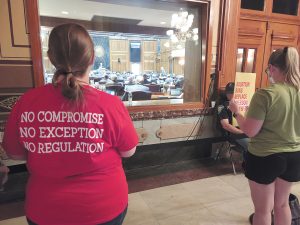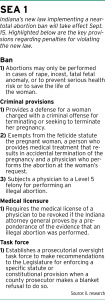Subscriber Benefit
As a subscriber you can listen to articles at work, in the car, or while you work out. Subscribe NowAlthough Indiana Republican legislators have been adamant that the state’s new abortion ban does not criminalize women, attorneys who have been reading the statute maintain the language is vague and prosecutors still have discretion.

“I would say that if you’re really wanting to put Hoosiers on notice about where the handcuffs come into play,” said attorney K. Michael Gaerte, “you have to throw this bill in the trash and start over again.”
As a partner at Dentons Bingham Greenebaum in Indianapolis, Gaerte’s practice includes health care litigation and representing physicians before the Medical Licensing Board of Indiana. His copy of the new abortion law, Senate Enrolled Act 1, is encased in a binder and littered with sticky notes and handwritten messages.
“It’s incredibly complicated,” Gaerte said of SEA 1. “I’ve been doing this for two decades and I still struggle with it.”
The new abortion law that was crafted during a two-week special session of the Indiana General Assembly will implement a near-total ban on abortion when it takes effect Sept. 15. Under the law, only pregnancies that are the result of rape or incest, put the mother’s health at risk, or involve a fetus with a lethal fetal anomaly can be terminated.
Even as legislative leaders say women who suffer a miscarriage or end their pregnancies illegally will not be charged with a crime, they note criminal penalties have been expanded for physicians. Medical doctors who perform an illegal abortion could be charged with a Level 5 felony, which carries a prison term between one and six years. Also, doctors who do not submit the required documents after an abortion could be charged with a Class B misdemeanor.
Dana Sussman, acting executive director of the National Advocates for Pregnant Women, said expanding abortion restrictions to include new criminal liabilities for medical professionals will create “exceedingly terrible health outcomes for both mothers and babies.” Physicians, Sussman continued, could have to delay treatment while they determine what kind of care they can legally provide.

As for women going to jail for getting abortions, Sussman said historically, the fringe of the anti-abortion movement has supported such an extreme position, but more people are starting to advocate for criminal penalties. That advocacy lurched into the public spotlight when the Louisiana Legislature briefly considered a bill earlier this year that would have subjected women to criminal homicide prosecutions for ending their pregnancies.
The criminal laws already in state statutes are being used against women who undergo abortions, Sussman said. She pointed to a Nebraska woman and her teenage daughter who were charged with the felony of concealing a dead human body, among other crimes, after the daughter allegedly had an abortion.
“Those are laws that have already been applied in the context of … allegations of self-managed abortion or pregnancy loss under ‘suspicious circumstances,’” Sussman said. “So my sense is that folks don’t really want to be explicit about criminalizing pregnant people, but the expansion of criminal laws is something that in this area will have serious implications for pregnant people.”
Confusing language
On the next to last day of the Legislature’s special session, the number of protestors in the Indiana Statehouse had dwindled to a handful.
 Michelle Ferguson stood outside of the House chamber and held a sign that stated, “Abortion Bans Replace Freedom with Force.” A few feet away, Ashley G., who declined to give her last name, wore a shirt with the slogan printed on the back: “No Compromise, No Exception, No Regulation.”
Michelle Ferguson stood outside of the House chamber and held a sign that stated, “Abortion Bans Replace Freedom with Force.” A few feet away, Ashley G., who declined to give her last name, wore a shirt with the slogan printed on the back: “No Compromise, No Exception, No Regulation.”
The women clearly articulated their opposing views on abortion, but both paused at the question of criminalizing women.
“I think it would be immoral to put them in prison,” Ferguson said. “I think the burden lies solely on the women in those situations. … If you’re putting the women in prison, the (father) walks free — that’s not equality.”

Ashley said that women who have had a single abortion should be cared for and not incarcerated. But if a woman is habitually getting pregnant, “not doing anything to prevent that pregnancy and murdering babies,” then the local prosecutor should be able to determine the response.
The Indiana Prosecuting Attorneys Council declined to comment on SEA 1. The Indiana Public Defender Council did answer questions, emphasizing it was not taking a position on access to abortion but rather was focused on the criminal aspects contained in the new law.
Section 48 of the new law addresses women who have an illegal abortion. Republicans say the section exempts women who unlawfully end pregnancies from the crime of feticide. However, the language in the section says, “It is a defense to any crime … ,” which has caused much confusion over whether the words accurately convey the intent.
IPDC reads the language as providing women with only a defense. Women who do not carry their pregnancy to term could still be charged and arrested, then have to go through the process of posting bond, hiring a criminal defense attorney, discovery and possibly a trial.
“I think the General Assembly put ‘defense’ in to signal to the state to not criminalize women, but they can’t control prosecutorial discretion,” said Bernice Corley, IPDC executive director. “It is not factual to say women couldn’t face charges.”
‘Dark new era’
One change made to SEA 1 as it worked through the Legislature brought relief to the Public Defender Council but placed another burden on physicians.
The requirement that a woman sign and have notarized an affidavit stating she was seeking an abortion because she was the victim of either rape or incest was removed. Now, doctors must certify in writing that the pregnancy is being terminated at the woman’s request because of rape or incest.
Gaerte noted the provision mandates that the physician put “(a)ll facts and reasons supporting the certification” into the written document. Requiring every fact to be listed, he said, is holding doctors to a higher standard than judges, lawyers and litigants.
The attorney said he foresees court challenges coming over the sections allowing for physicians to be charged with a felony and requiring the revocation of their medical licenses if a physician performs an illegal abortion.
Notably, the felony provision could be argued as being unconstitutionally vague, Gaerte said. He highlighted the language that an abortion is allowed “to prevent any serious health risk to the pregnant woman,” which is defined as “substantial and irreversible physical impairment of a major bodily function.”
Physicians will have to decide whether the harm a woman will suffer without an abortion rises to that level.

“That is a very, very difficult task for lawyers,” Gaerte said, “much less doctors.”
If the physician violates the law, the medical licensing board must revoke his or her license. Gaerte said he sees this provision as creating “a really huge potential separation of powers issue,” because nowhere else in state law is the Legislature telling “an independent statutorily created entity” to take such action.
Overall, he said he believes the bill will have a chilling effect in the way that physicians treat their patients.
“This is a dark new era,” Gaerte said. “This has taken years to get to this point and it will take years, if ever, to clarify these issues. In the middle, you’re going to have physicians that are twisting.”•
Please enable JavaScript to view this content.
